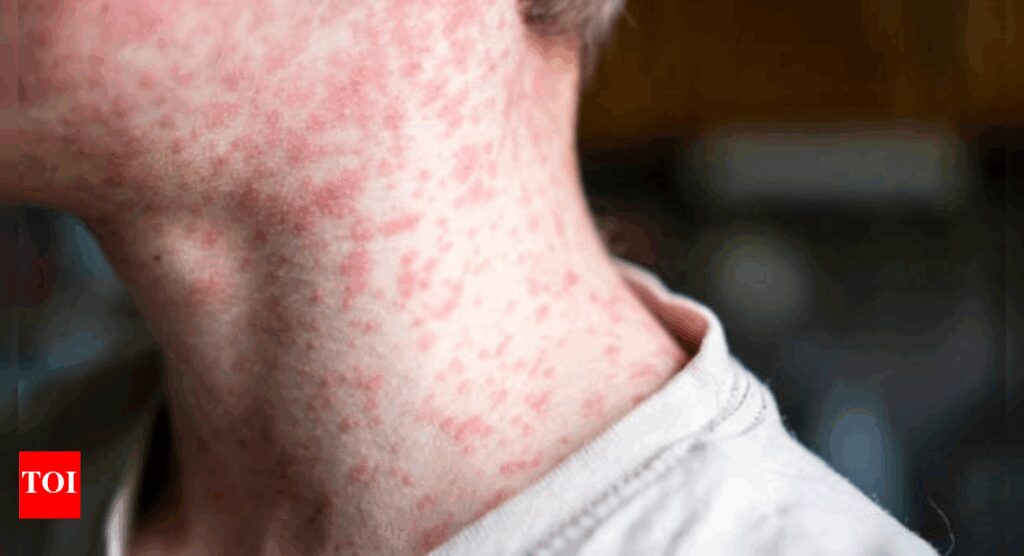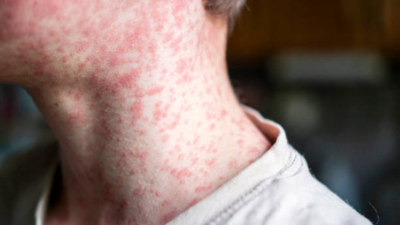We all know measles is brutal while it’s happening—rash, fever, cough, those ugly red eyes. But what too many people miss is that the danger doesn’t end when the rash clears. Measles has a sneaky villain arc: it weakens your immune system, opens doors to other infections, and can even come back to haunt you years later. Let’s unpack the aftermath of measles beyond the obvious.Measles is making a troubling comeback in the U.S.—and it’s hitting a 33-year high. As of mid-2025, health officials have reported more cases than we’ve seen since the early 1990s. What’s fueling the surge? A mix of lower vaccination rates, international travel, and misinformation. The disease, once thought nearly wiped out, is now popping up in schools, airports, and even summer camps. Most of the cases are in kids and young adults who weren’t vaccinated or only got one dose.
And let’s be clear—measles isn’t just a rash and a fever. It can lead to pneumonia, brain swelling, hearing loss, and other long-term damage. Health experts are sounding the alarm, urging people to check their vaccination status. This isn’t just a little outbreak—it’s a wake-up call. The virus is contagious, serious, and it’s definitely not something you want to take lightly.
Immune amnesia: When your defense forgets
Measles doesn’t just attack; it erases. After infection, it wipes out most of your immune memory cells—the ones that remember how to fight off everything from the flu to chickenpox. This isn’t minor; it’s like your immune system taking a several‑year timeout.You might shake off measles, but your body is suddenly defenseless against other diseases. Studies show increased vulnerability to pneumonia, ear infections, diarrhea, meningitis, and more for the next 2–3 years, possibly even longer .One real-world study from Brazil found that measles outbreaks weren’t just about measles—they correlated with higher non-measles infection deaths among kids. It’s a domino effect: measles knocks you down, and something else starts.
Respiratory infections
Ever had measles and thought the cough would never quit? That’s because pneumonia—or bronchial pneumonia—often tags along. In kids under five, this is the deadliest complication. Either the measles virus itself wrecks lung tissue, or bacteria like Streptococcus pneumoniae swoop in for the kill. Suddenly, what started as a rash and sniffle becomes a full-blown fight to breathe. Hospitals see a flood of young patients during outbreaks. Even if survival rates are high with antibiotics, it leaves parents nervous—and kids weaker than before.
Diarrhea and dehydration
Measles doesn’t just mess with your lungs—it storms your gut too. Persistent diarrhea is super common, especially in toddlers, and it drains them fast. Fluids that should cushion their organs get flushed out. Before you know it, you’ve got a dehydrated kid who won’t eat, cries more, and has sunken eyes. In developing countries, diarrhea from measles is a major killer. Even here, it can send kids to IV ports and pediatric wards.
Ear infections (otitis media)
About one in ten kids with measles walk home with ringing ears—or worse, hearing loss. That’s because the virus inflames the eustachian tube and middle ear, setting up a perfect stage for bacterial takeover. Their little ears fill with fluid, pressure builds, and they cry more than usual. If you don’t treat it fast—antibiotics and ear drainage—it can scar the eardrum or mess with hearing long-term.
Subacute sclerosing panencephalitis (SSPE)
This one is the worst slow-burn tragedy: SSPE. Years—7 to 10—after a measles infection, usually in unvaccinated kids, they reappear as another illness. At first it’s subtle: behavioral changes, mood swings. But as it progresses, they develop seizures, muscle spasms, memory loss. Their brain literally shrivels. SSPE is progressive. It’s heartbreaking because it affects kids who seemed fine post-measles.
Myocarditis
Your heart getting measles isn’t common, but when it does, it’s scary. Myocarditis means inflammation—your heart muscle gets swollen, irritated, and can’t pump well. After measles, it can sneak up with chest pain, fatigue, irregular heartbeat—but sometimes symptoms barely register until things go sideways. Doctors treat it carefully, balancing fluids and watching heart rhythm on monitors. Many recover with full heart function, but some are left with lingering weakness or may need long-term meds. You survive the worst rash of your life, and then your heart decides it’s its turn to stage a crisis—it’s not cool.
Blindness
Measles can go for your eyes in a big way. The virus can trigger keratitis (corneal inflammation) or corneal ulcers, especially in kids who aren’t getting vitamin A. Those are like painful open sores on your eye. The worst part? In shelters or impoverished regions, kids lose their vision entirely because healing is shot. Even in wealthier countries, vitamin A supplementation and eye drops can only do so much—once damage is done, there’s no rewind button. Imagine recovering from measles only to find yourself blind. That’s why ophthalmologists push vitamin A during measles outbreaks.
Pregnancy complications
Pregnant moms, watch out—measles isn’t just selfish about who it infects; it messes with babies, too. Pregnant women who catch it face higher risks: miscarriage, premature labor, or delivering low-birth-weight infants. Even if mom survives, babies can struggle to thrive or come out medically fragile. It’s not enough to just blanket worry—it’s urgent. That’s why obstetricians push on vaccination and avoid travel during outbreaks. Measles in pregnancy isn’t a “mild infection”—it targets two lives at once, and health teams tiptoe to save both.Each complication highlights that measles isn’t just a rash and runny eyes—it’s a full-body troublemaker. Stay safe, get vaccinated, and recognize those ripples before it’s too late.Disclaimer:This article is intended for general informational purposes only and is not a substitute for professional medical advice, diagnosis, or treatment. The health effects and complications of measles discussed are based on current medical literature and public health data as of July 2025. Readers are encouraged to consult qualified healthcare providers for personalized guidance. Measles-related risks may vary depending on age, vaccination status, and individual health conditions. Always verify outbreak updates and medical recommendations through official health authorities like the CDC or WHO.







